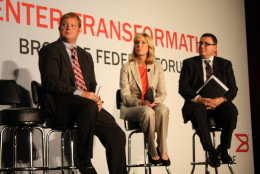Budget
-
Evan Lesser, founder and director of ClearanceJobs.com, talks about how the job market is changing for federal workers with high security clearances. August 31, 2012
August 31, 2012 -
Civilian agencies may lose almost $40 billion dollars in top-line funding if sequestration goes into effect on Jan. 2, according to a new analysis by the Professional Services Council. Using fiscal 2012 as a baseline, PSC calculated civilian discretionary spending would decline by $39 billion and that individual agency budget would decline by 7.8 percent. More granular data are hard to come by until the Office of Management and Budget provides more details about specific about how the cuts will affect specific programs.
August 30, 2012 -
On this week's Bloomberg Government Capital Impact show, analysts will discuss the GOP convention in Tampa, preparations for sequestration, and what caused the budget crisis. August 30, 2012
August 30, 2012 -
The General Services Administration projects it will save $11 million from April to September from reforms to employee travel and agency conferences. Since April, GSA canceled 47 conferences.
August 29, 2012 -
To avoid lay-offs, this week the mail agency offered early retirements to more than 3,300 employees who will retire Dec. 31, 2012.
August 28, 2012 -
Rep. John Sarbanes (D-Md.), whose district in the Washington, D.C., suburbs is home to many federal employees, said he understands the frustration voiced by federal unions about a de facto extension of the federal pay freeze. Sarbanes said too often lawmakers used federal pay and benefits as a "piggybank" in deficit- reduction efforts.
August 27, 2012 -
Most of the Pentagon's contract spending wouldn't take an immediate hit from sequestration. Conversely, civilian employees would likely be laid-off or furloughed in the few days or weeks after the automatic budget cuts kick in, according to a Washington think tank's analysis of the convoluted laws that govern the automatic cuts
August 27, 2012 -
Jenny Mattingley hosts of roundtable discussion of legislation pending in Congress that affect federal workers. August 24, 2012
August 24, 2012 -
Postal regulators agreed with a Postal Service plan to cut the window hours at 13,000 post offices. Operating hours will be cut to six, four or even two hours per weekday at these locations.
August 24, 2012 -
So, how does data center consolidation open doors for mission improvements? How does data center consolidation change the way you have to buy and manage mission critical systems? And how can agencies move money from operating and maintaining a data center to developing, modernizing and enhancing mission-critical systems?
August 24, 2012 -
A 15-minute training video that cost $52,000 to make joins the examples of excessive spending at two Veterans Affairs' conferences last year with a total pricetag of $5 million.
August 23, 2012 -
Dan Blair, DoD's deputy inspector general for auditing, blames delays on a new, resource planning system. He says the department has inconsistent controls and unreliable data.
August 22, 2012 -
Spending levels appropriated by Congress, so far, for fiscal 2013 fail to live within the limits set by last year's Budget Control Act (BCA), the Office of Management and Budget said in a report issued Monday. If Congress fails to adhere to the annual limits, OMB is required to enact automatic cuts to bring them back into balance, Acting OMB Director Jeffrey Zients wrote in a letter to President Barack Obama that preceded OMB's report.
August 21, 2012 -
A new survey from the National Treasury Employees Union finds two-thirds of Americans said Congress should raise taxes on the country's wealthiest citizens before cutting vital public services. However, others say the survey didn't ask the right questions.
August 20, 2012 -
OMB issued fiscal 2014 technology project guidance detailing the steps agencies should take to reduce spending across six areas. Agencies also must tell OMB how it would reinvest the savings into new or innovative projects.
August 17, 2012



